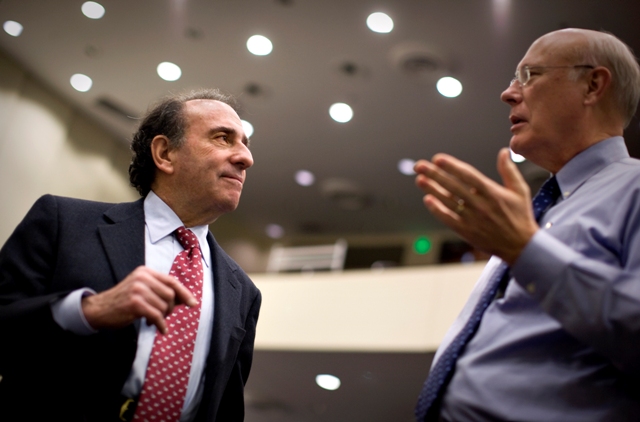
Dr. Jay Levy, left, speaks with Dr. John Dame, professor and chair of infectious diseases and pathology at the UF College of Veterinary Medicine. Photo by Sarah Kiewel
Jay Levy, M.D., one of the discoverers of HIV, the virus that causes AIDS, called on the University of Florida this week to partner with Caribbean and Latin American nations in the fight to control the spread of HIV/AIDS.
The scientific expertise at the university and physical proximity to these regions lend themselves to such collaboration and influence.
The Caribbean has the second highest rate — after sub-Saharan Africa — of adults living with HIV/AIDS. In Latin America, 1.7 million people are living with the disease.
Levy, whose group was also the first to demonstrate that condoms reduce HIV transmission, also talked about his latest research on a product of white blood cells that can block HIV replication.
Levy spoke Wednesday at the second annual meeting of the fledgling Florida Center for AIDS Research, which is based at UF and led by Maureen Goodenow, Ph.D., the Stephany W. Holloway university chair for AIDS research at UF’s College of Medicine.
He outlined the state of the global pandemic, and highlighted current areas of research such as trials in which circumcision resulted in reduced HIV transmission in certain populations. Shortcomings in study design have hampered other research, such as the use of diaphragms.
Thirty-three millions people around the world are infected with HIV, and 2.7 million are newly infected each year. In the United States, 1.1 million people are living with the disease, and more than 56,000 are newly infected each year, according to Kaiser Family Foundation data.
“This is becoming and has now become the worst epidemic to hit humankind,” Levy said. HIV is the fourth leading cause of death globally, and the leading cause of infectious disease deaths.
Levy’s research involves trying to determine why some people who are infected with HIV survive for very long periods without progressing to an AIDS diagnosis. Levy in 1986 discovered that a certain type of immune system cell called CD8+ produced a protein he called a “factor” that suppresses viral activity. That work has spurred research efforts by others to try to determine what the factor is made of and how it works. The research could fuel the development of new anti-viral agents.
“I think it’s going to be very important for HIV, but also for other chronic viruses such as hepatitis C,” said virologist James Maruniak, Ph.D., who is an assistant professor in UF’s entomology and nematology department.
Levy is collaborating with Janet Yamamoto, Ph.D., a co-discoverer of the feline AIDS vaccine and a professor in the department of infectious disease and pathology in UF’s College of Veterinary Medicine.
Advances in AIDS research at the University of Florida could, in time, have a direct impact on HIV infection rates in nearby countries, faculty scientists say.
“We’re positioned geographically, and if we position ourselves professionally to pursue that, we could have an impact on the epidemic in a part of the world we have access to,” said biochemist John Dame, Ph.D., chairman of the department of pathology in the College of Veterinary Medicine.
